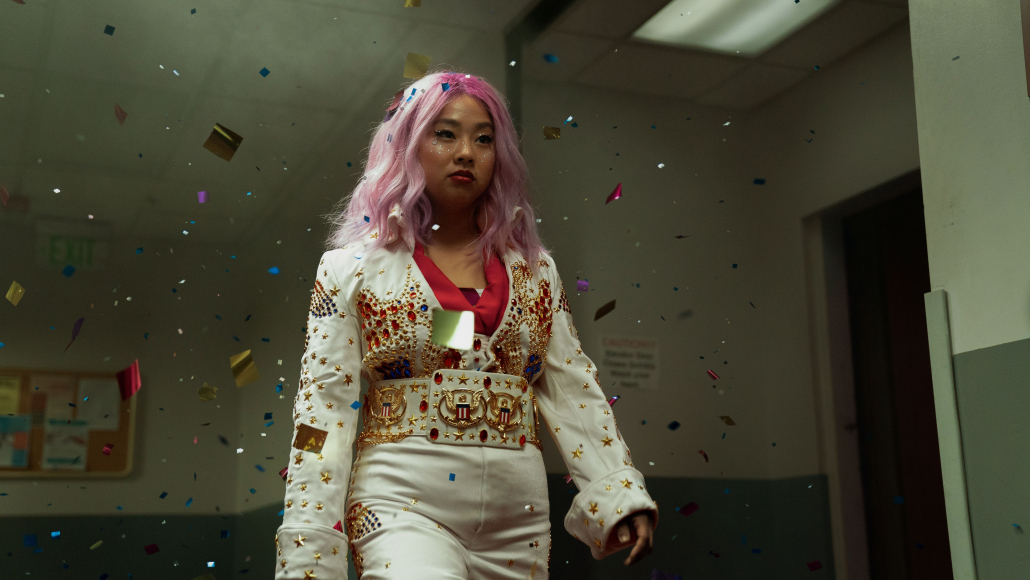A conversation with Stephanie Hsu

Since its 2022 release, “Everything Everywhere All At Once” has been a topic of conversation in Hollywood on account of its originality, creativity and ability to captivate its audience with the universal themes of family, love and acceptance. At the heart of the story is the relationship between Evelyn Wang (Michelle Yeoh) and Joy Wang/Jobu Tupaki (Stephanie Hsu). Hsu’s Oscar-nominated performance conveyed the complexity of being a queer, Chinese American woman against the backdrop of a colossal and entertaining multiverse-sized plot.
Bovard Auditorium buzzed Wednesday with excitement and anticipation before “A Conversation with Stephanie Hsu” began. Students were eager to see Hsu, as they admired her nuanced and masterful performances. The event was co-sponsored by the Asian Pacific American Student Assembly and USC Speakers Committee and had a great turnout as a line formed as early as 4:30 p.m. from Bovard all the way down to Taper Hall.
Hsu has also won a SAG Award (Best Ensemble) for her work as Mei Lin in “The Marvelous Mrs. Maisel.” Her roles have not been limited to film and television: Hsu has also portrayed Karen the Computer in “The SpongeBob Musical” and Christine Canigula in “Be More Chill” on Broadway. She is set to appear in various upcoming projects such as “American Born Chinese,” directed by Lucy Liu and Destin Daniel Cretton, as well as “Joy Ride,” directed by Adele Lim.
“To be able to engage with Stephanie, learn about her journey, learn about obstacles she’s had to overcome and how she’s been able to find her voice as an APIDA artist is important for the APIDA community here at USC,” said Emma Hsu, one of APASA’s co-directors and coordinators of the event and a senior majoring in applied and computational mathematics.
Emma Hsu said that APASA expected the event to be packed because they had received an overwhelming amount of RSVPs on EngageSC.
“I am really excited to meet her in person,” said Juan Garcia, a Ph.D. student studying electrical engineering. “I am really fond of her work after seeing her in ‘Everything Everywhere All at Once,’ and I’m also excited because she’s appearing in her next film, ‘Joy Ride.’”
Students patiently waited in line, some standing, others sitting on the floor, as plentiful conversations about the impact of Hsu’s work could be heard. The energy and enthusiasm culminated in Hsu’s arrival via golf cart as audience members clapped and yelled with excitement.
As the crowd rolled into Bovard Auditorium, the environment was electric and filled with anticipation. Emma Hsu and APASA’s other co-director, Sophia Lu, introduced the two moderators of the night, Sea Gira and Justin Wang.
Shortly after, Stephanie Hsu’s entrance was met with thundering applause as she waved to the crowd of students. As she admired a packed Bovard, Hsu told the audience that she felt inspired already.
Hsu spoke about the humble beginnings of her career. Her time and experience in experimental, downtown theater in New York helped her see why she wanted to be an actress. Experimental theater helped Hsu recognize that she loved making things with people she loved.
The conversation then segued into the “elephant in the room,” as cleverly put by Wang, thus turning the conversation toward her experience in “Everything Everywhere All At Once.” When speaking about the awards season success of the film, Hsu said that the film’s accomplishments will be solidified in history until the end of time. “Everything Everywhere All At Once”’s trailblazing successes will positively impact future APIDA representation in Hollywood. Hsu added that the film’s vision encapsulated so much of what she wants to see from the world and art.
Emma Hsu echoed this as she said, “Stephanie Hsu, APIDA-identifying people in the film industry are, you know, spearheading the wave for more Asian, more APIDA representation.”
Stephanie Hsu shared that playing Joy taught her that there are so many people, like herself, that experience intergenerational trauma. Her words were met with vehement applause as she continued and said that having that knowledge makes her, as a creator, feel as if she is not alone.
Hsu also touched on the harmful stereotypes about the APIDA community. She spoke about the toll of the silent and model minority tropes and detailed the way in which “Everything Everywhere All At Once” was able to combat these stereotypes through portraying honest family dynamics. The intergenerational aspect of “Everything Everywhere All At Once” was crucial as Hsu praised the third generation element of the film’s family dynamic, referencing the important role of Gong Gong, played by James Hong.
Esther Jung, a sophomore majoring in psychology, discussed the impact of these stereotypes, “There isn’t much realistic representation of the Asian community, which I feel like also aids to the biases that we see a lot in society, so I was really excited to see [Hsu] and hear her own personal insight.”
Hsu’s portrayal of Joy Wang, a young, queer Chinese American woman, transformed her into an icon. Hsu said she observed that as a result of this film, there has been a circle of intergenerational healing. Hsu’s powerful statement that she hopes Hollywood will one day get to a place where everybody is queer and rainbow was met with a roar of applause and cheers.
She imagined the ideal Hollywood environment, one that still must be cultivated, in which differences do not have to be re-emphasized in order to make sure the APIDA community is heard. Hsu said it is important to move the needle forward by creating impactful stories that combat stereotypes and break down barriers.
The sentimentality and personal impact that “Everything Everywhere All At Once” has had on audiences was discussed as Hsu praised the feeling of belonging and acceptance that the film has inspired. She refuted the ease with which people are told that their dreams are impossible or unattainable by presenting her own experience as evidence that people can achieve their aspirations.

